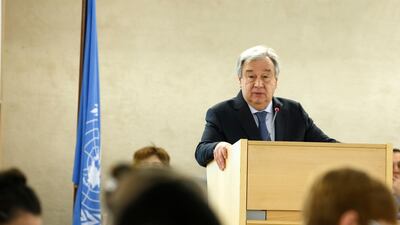The United Nations will scale up its efforts to tackle hate speech, including antisemitism and anti-Muslim rhetoric, Antonio Guterres, the UN Secretary General said on Monday.
The UN chief warned that xenophobia is moving into the mainstream, and cautioned against what were once pariah political parties gaining government influence.
"We are seeing a groundswell of xenophobia, harassment, intolerance, including rising antisemitism and anti-Muslim hatred," Mr Guterres said at the opening session of the 40th Human Rights Council.
Mr Guterres said he asked his Special Adviser on the Prevention of Genocide Adama Dieng to fast track a global strategy to prevent hate speech both in political discourse and online.
He said he asked the Senegalese lawyer and veteran UN diplomat to "define a system-wide strategy and present a global plan of action on a fast-track basis" to combat hate speech.
Countries around the world have seen the rise in populist politics, including France and Germany – both have raised alarm over resurgent anti-semitism.
Hate speech is spreading through two channels, Mr Guterres warned: through social media and in public life.
"Hate speech is a menace to democratic values, social stability, and peace. It spreads like wildfire through social media, the internet and conspiracy theories," he said. While the discourse surrounding the movement of people has been "poisoned with false narratives linking refugees and migrants to terrorism and scapegoating them for many of societies ills".
But while hate speech has been on the rise, the UN's Global Compact for Migration, which was signed in December last year amid populist criticism, provides hope.
"An insidious campaign sought to drown the Global Compact for Migration in a flood of lies about the nature and scope of the agreement," he said. However, noted the UN chief, the campaign "failed".
But 17 countries either abstained or voted against the compact at the General Assembly in December and debate over the text fuelled bitter political debate especially in Europe.
Tackling hate speech and reaffirming the values of the UN Charter is one of Mr Guterres' goals for 2019, the others will focus on environmental issues and diplomacy. Mr Guterres also criticised the targeting and surveillance of activists and journalists.
Mr Guterres also praised progress in gender issues, but expressed frustration at slow improvement in economic empowerment.
"I do not accept a world that tells my granddaughters that economic equality can wait for their granddaughter’s granddaughters," he said.

